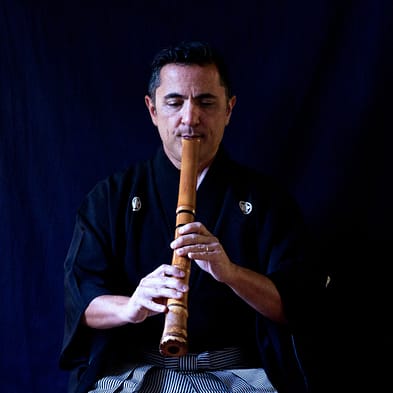The shakuhachi, an end-blown bamboo flute, is among the most recognizable of Japan’s traditional instruments. The instrument is associated with the Fuke sect of Zen buddhism in the practice of sui zen. Join us at the Cultural Corner from 1:15 – 2:30pm for a shakuhachi performance by Hanzaburo, Araki Kodō VI. The Araki Family has been playing and passing down the skills and traditions of Kinko-Ryu shakuhachi since the 19th century.

For six generations, the Araki family has carried the Kodō name and its perspective on the tradition of Kinko-Ryū shakuhachi. Named for his great-great grandfather, Hanzaburō, or Hanz as he’s commonly known, made his professional debut in 1988 in Shimonoseki, Japan where he was given the name Baikyoku by his father, Kodō Araki V. He attained the name Kodō at his father’s retirement ceremony in Tokyo in 2009. Hanz performed and taught in Japan until 1992 when he returned to the United States and shifted his focus almost entirely to performing. Notable appearances include The Newport Folk Festival, The Vancouver Folk Festival, Celtic Connections in Glasgow, Kiyomizu Temple in Kyoto, The Gates Estate, and was a featured soloist for The Seattle Symphony “Celebrate Asia” concert in 2013. He was also invited to perform and speak at the Interdependence Day Celebration in Mexico City and The Future of Music Coalition conference in Rio de Janeiro. In addition to his career in traditional Japanese music Hanz is a Juno Award-winning Irish flute and whistle player and singer. His most recent album of Irish music was recorded in his mother’s ancestral village of Dingle, Co. Kerry with Lúnasa founding member Donogh Hennessy producing.
